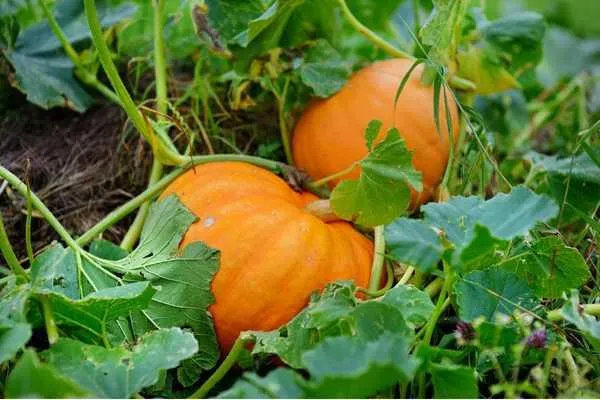

EDUCATION ARTICLES

Cinderella Surprise
Early in the spring of this year, we turned on the drip system to our garden to revive some dormant spinach plants leftover from the fall. One morning, I noticed two oval leaves budding out at the end of a drip line. It looked like a type of squash. Was it a seedling from last year? What a pleasant surprise! I left it, hoping it would survive the cold nights.
The weeks passed, and a visiting friend commented, “Maybe it’s a pumpkin.” In my ignorance, I quickly shrugged the suggestion off. “I’ve never purchased or planted pumpkin seeds,” I thought, “and this was a volunteer plant.”
By May, the leaves were spreading out, creeping beyond the neighboring tomatoes. I decided to inspect the situation. Lifting a large leaf, I discovered a round, dark green fruit. Within two weeks, like a Cinderella surprise, the dark green color turned to bright harvest orange: fall magic in mid-June. I sent pictures to my family like a new baby had arrived. Soon, the large plant was growing two more pumpkins. We gifted one to the same friend who identified it earlier—a Fourth of July present.
While considering the strangeness of the event, I suddenly had a thought. I turned to my young boys and asked, “Do you remember carving pumpkins last year with Dad? What did you do with the seeds you scooped out?” Large, light-bulb smiles lit their faces as they exclaimed, “Oh, yes! We planted them!” And since it was now known who the owners were, my two boys quickly claimed and named the two remaining pumpkins as their own: Big Orange and Big Buddha!
I didn’t want to waste the two remaining pumpkins, and we couldn’t decorate with them in the heat of the summer; they would have melted on the front porch. While I had never attempted to grow a pumpkin through the St. George summer, Staheli Farms Pumpkin Patch had seemed to pull it off consistently. These pumpkins were orange and ready to go, so I picked them.

With just a bit of reluctance from one of my sons, I was allowed to chop up Big Orange into small, quarter-inch pieces for the freezer. “These will be wonderful in future soups and casseroles,” I thought. I made a delicious pumpkin curry dinner right away and shredded about two cups as a breakfast hash.
The carbohydrate content of pumpkin is about one quarter that of a sweet potato. Although not as nutrient dense as a sweet potato, it gives off a lower glycemic load due to its low carb content—unless, of course, it’s made into a dessert. So if you are trying to decrease your carb consumption for various reasons, pumpkin does well as a substitute for potatoes. Just find recipes that help round out the flavors well.
I wanted to puree Big Buddha, the remaining pumpkin. So after promising my second son that I would make some pumpkin chocolate chip cookies with some of the puree, permission was granted without tears. First, I placed large chunks in an Instant Pot with water for steaming and softening. It took three rounds of this to do the entire pumpkin. Then I scooped the soft flesh from the outside shell and pureed it in batches with a high-powered blender. I poured the puree into quart-size freezer bags and placed them flat in the freezer (pint-size glass jars could also be used for this). I have since been searching the internet for dishes that call for pureed pumpkin. We are likely to be on a high pumpkin diet this fall.
I hope you enjoy your own pumpkin dishes as the world is turning orange and red. While carving your pumpkins for Halloween, throw a seed or two into a garden plot, and water it in early spring. I’m not promising anything, but you never know what a little experimentation might bring.
